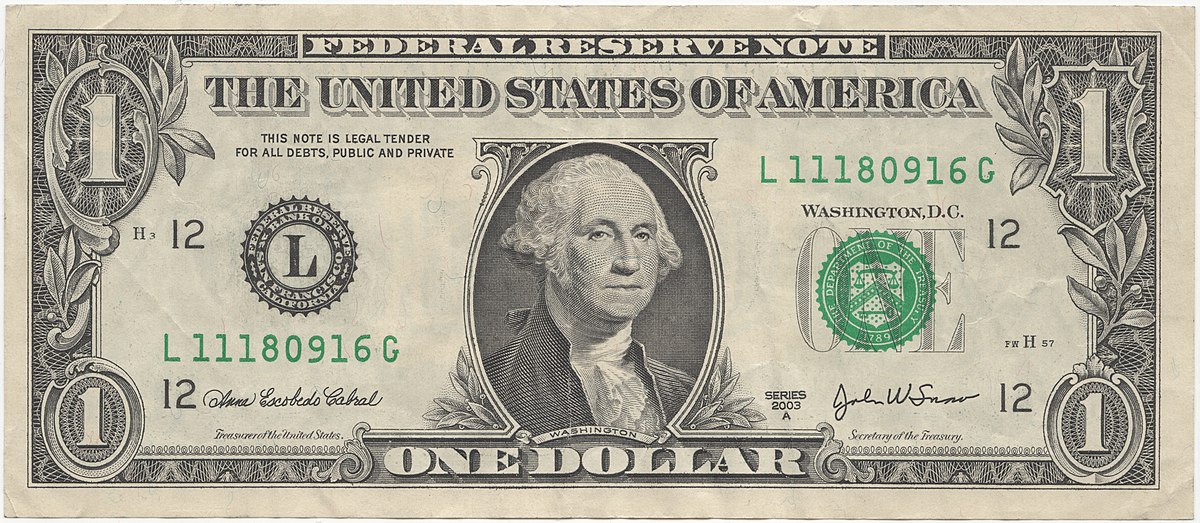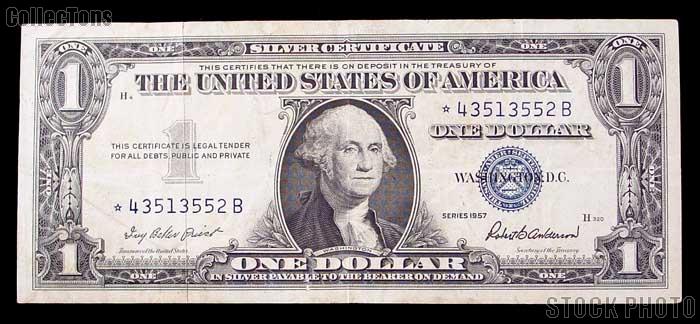JimBowie1958
Old Fogey
- Sep 25, 2011
- 63,590
- 16,753
- 2,220
This is, believe it or not, a simplification of our monetary system and how it works.There are some erroneous notions, but overall it is accurate and visually entertaining, as I understand it.
Where it is kind of inaccurate is where the notion of 'currency' comes from and what those little pieces of paper most of us call US dollars actually are.
!. 'Currency' is whatever a bunch of people are willing to trade for other forms of wealth. If there was a constant demand for sea shells, and I had every confidence that their value would continue to increase, I might take some sea shells in trade for my car or a book, etc. Those sea shells are then 'currency' because of their relatively small size that allows me to carry them conveniently and trade with other people. Gold, silver, jewels, titles of ownership of real estate and credit notes (even zeroes in an online credit ledger like Bitcoin) are forms of currency used today.
2. 'Legal Tender' are those forms of currency that the government says one must honor no matter what your perception of their value actually is. If you owe me a debt for land I sold you, perhaps in trade for sea shells, lol, I cannot refuse to accept the legal tender in exchange for it. All I can do is haggle over the price which the court system or some arbitration company/court has to sign off on if we cannot reach agreement. I can refuse barrels of oil, silver bullion, fur skins, etc for whateer reson I want, but I cannot turn down payment of the debt owed to me in the legal tender which is FRNs (Federal Reserve Notes).
3. a US Federal Reserve bank note is not a dollar, but the promise of a dollar in credit.
Note the difference between the current USD note and older paper certificates.


The US dollar was defined by law to being seven tenths of an ounce of silver and a 'silver certificate' was essentially a pledge that the silver was on deposit in the US Treasury. You could take your silver certificate to the Treasury or local bank and get your silver in the form of coins made of silver alloy that was 70% silver.
So around 1964 we went from using certificates to using Federal Reserve credit for US dollars and stopped making our coins out of silver. From 1913 there had been little inflation till 1964 as the value of the currency was tied to this ratio of silver and 25 dollars per ounce of gold.
Now, as I perceive it, there are strengths to this FR system in that it is using a group of professionals to make and manage our currency for us at a small interest rate of 6% profit on the transactions. Essentially we are 'outsourcing' our monetary system to experts who specialize in this sort of thing, and everybody charges for their services and the banks are no different.
Strength number one: These banks have an incentive to keep value in the US dollar. A 2% inflation rate is a monetary goal to allow them room to fight deflation by lowering interest rates. Not having that room is referred to as a liquidity trap. This situation is to be avoided at all costs and the last 20 years of Japanese economy is evidence for that as it has been stuck toggling between anemic growth and recession for that whole time. These pros have no incentive to destroy their own wealth.
Strength number two: If anyone can spin confidence in a system of credit, these Houdini's can. They are the best confidence men in the world when it comes to currency and perceived value. This helps to maintain the currency value though it can be oversold and flirt with hyperinflation if that confidence is suddenly lost. They can chat other experts around the world into nearly anything and have been for about 80 years now.
Strength three: as the legal tender of the largest economy in the world by far, the US Federal Reserve Note will always be in demand, especially with the cooperation of the Arab oil nations that demand all payments for oil in the form of these Reserve notes.
So what gives the US dollar (aka Federal Reserve Notes) their value?
a) confidence in their value. This is sort of a tautology but it works in the field of currency by definition.
b) The management of that currency by the Federal Reserve which has a stake in the continued success of the currency system.
c) the demand for USD as the world reserve currency keeps demand for the USD high.
d) the position the FRN has as legal tender in the worlds largest economy also boosts this demand and thus it's value.
Now the proof of the strength of this system is that we have had sustained economic growth since 1913 with relatively little inflation as compared to the other currencies around the world (Germany, Isreal, Argentina for example), and the USD today is worth about 1/20th what it was in 1913 or 1964, as valued in silver ( old USD = 0.7 ounces of silver as compared to 0.07). While that complicates my retirement money calculations, it is over all fairly respectable.
So while the Federal Reserve banking system has its issues, success is not one of them.
Where it is kind of inaccurate is where the notion of 'currency' comes from and what those little pieces of paper most of us call US dollars actually are.
!. 'Currency' is whatever a bunch of people are willing to trade for other forms of wealth. If there was a constant demand for sea shells, and I had every confidence that their value would continue to increase, I might take some sea shells in trade for my car or a book, etc. Those sea shells are then 'currency' because of their relatively small size that allows me to carry them conveniently and trade with other people. Gold, silver, jewels, titles of ownership of real estate and credit notes (even zeroes in an online credit ledger like Bitcoin) are forms of currency used today.
2. 'Legal Tender' are those forms of currency that the government says one must honor no matter what your perception of their value actually is. If you owe me a debt for land I sold you, perhaps in trade for sea shells, lol, I cannot refuse to accept the legal tender in exchange for it. All I can do is haggle over the price which the court system or some arbitration company/court has to sign off on if we cannot reach agreement. I can refuse barrels of oil, silver bullion, fur skins, etc for whateer reson I want, but I cannot turn down payment of the debt owed to me in the legal tender which is FRNs (Federal Reserve Notes).
3. a US Federal Reserve bank note is not a dollar, but the promise of a dollar in credit.
Note the difference between the current USD note and older paper certificates.


The US dollar was defined by law to being seven tenths of an ounce of silver and a 'silver certificate' was essentially a pledge that the silver was on deposit in the US Treasury. You could take your silver certificate to the Treasury or local bank and get your silver in the form of coins made of silver alloy that was 70% silver.
So around 1964 we went from using certificates to using Federal Reserve credit for US dollars and stopped making our coins out of silver. From 1913 there had been little inflation till 1964 as the value of the currency was tied to this ratio of silver and 25 dollars per ounce of gold.
Now, as I perceive it, there are strengths to this FR system in that it is using a group of professionals to make and manage our currency for us at a small interest rate of 6% profit on the transactions. Essentially we are 'outsourcing' our monetary system to experts who specialize in this sort of thing, and everybody charges for their services and the banks are no different.
Strength number one: These banks have an incentive to keep value in the US dollar. A 2% inflation rate is a monetary goal to allow them room to fight deflation by lowering interest rates. Not having that room is referred to as a liquidity trap. This situation is to be avoided at all costs and the last 20 years of Japanese economy is evidence for that as it has been stuck toggling between anemic growth and recession for that whole time. These pros have no incentive to destroy their own wealth.
Strength number two: If anyone can spin confidence in a system of credit, these Houdini's can. They are the best confidence men in the world when it comes to currency and perceived value. This helps to maintain the currency value though it can be oversold and flirt with hyperinflation if that confidence is suddenly lost. They can chat other experts around the world into nearly anything and have been for about 80 years now.
Strength three: as the legal tender of the largest economy in the world by far, the US Federal Reserve Note will always be in demand, especially with the cooperation of the Arab oil nations that demand all payments for oil in the form of these Reserve notes.
So what gives the US dollar (aka Federal Reserve Notes) their value?
a) confidence in their value. This is sort of a tautology but it works in the field of currency by definition.
b) The management of that currency by the Federal Reserve which has a stake in the continued success of the currency system.
c) the demand for USD as the world reserve currency keeps demand for the USD high.
d) the position the FRN has as legal tender in the worlds largest economy also boosts this demand and thus it's value.
Now the proof of the strength of this system is that we have had sustained economic growth since 1913 with relatively little inflation as compared to the other currencies around the world (Germany, Isreal, Argentina for example), and the USD today is worth about 1/20th what it was in 1913 or 1964, as valued in silver ( old USD = 0.7 ounces of silver as compared to 0.07). While that complicates my retirement money calculations, it is over all fairly respectable.
So while the Federal Reserve banking system has its issues, success is not one of them.
Last edited:

